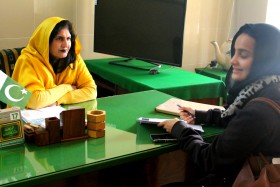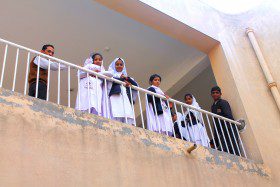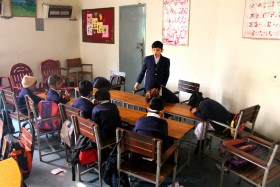By Syeda Farwa Fatima, International Education Policy, Ed.M Harvard Graduate School of Education ‘16
This is part of a recurring series in which we share reports from Harvard students who have traveled to South Asia with support from a SAI grant during the winter session.
Click here to read more reports from students.
Farwa received a research grant from SAI to study the special education system in Pakistan.
While certain debates over the past decade have focused on increasing rights for people with disabilities, the recently adopted Education 2030 agenda with the landmark Sustainable Development Goals (SDGs) 2015, has secured a safe place for comprehensive actions for inclusive education. SDG 4 aptly calls to ‘Ensure inclusive and equitable quality education and promote lifelong learning opportunities for all, specifically for ‘persons with disabilities’. A recent report traces out how one in three of the 72 million out of school children in 2007 had a disability – a statistic that is yet to be updated for the current figure of 56 million out of school children.
In the context of Pakistan – which already has the second highest population of out of school children, a JICA report quotes how ‘persons with disabilities are mostly unseen, unheard and uncounted’ thereby constituting the most marginalized group of the country. The regular government school system functions independently of the special education system, except for a few private schools that have started to acknowledge inclusive practices. However, such schools are mostly located in bigger cities and target a niche population that can afford the services. Despite numerous policy agendas, including the National Policy for Persons with Disability that specifically advocated for a shift from exclusion to inclusion, followed by The National Plan of Action to execute this policy (which never took off), Pakistan failed miserably to achieve the targets set. The National Education Policy vouches ‘to equalize access to education through provision of special facilities to boys and girls alike, underprivileged/marginalized groups and handicapped children and adults.’ Unfortunately, little has been done to translate the policy into action.

Interviewing a government official on the status of state run special education institutes in Pakistan
Photo credits: Sunair Hassan
With the courtesy of South Asia Institute at Harvard University, I decided to conduct a small pilot study to understand how social perspectives of different stakeholders frame the special education system in Pakistan. I designed a very simple survey form, no more than thirteen questions, comprising mostly of close-ended responses with an exception of three. I approached government officials in education and special education ministries, school leaders and teachers in special and general education schools, parents of special and non-special needs children and general community members associated with special and non-special needs children. However, as per the scope of the study, I drew my sample from the eclectic city of Lahore. Along with two helpful colleagues and a driver, I personally visited each of my respondents. This took me around the city from grounds of government-run special education schools including Government Centers for Special Education at different ends of the city, privately-run special education schools that included the likes of Amin Maktab Center of Special Education and Training and Rising Sun School along with the Education Ministry at large.
During my field experiences, I interacted with a combination of different personalities that exposed me to a range of emotions- ranging from ardent passion, zealous fervor, committed beliefs to hopeless skepticism, opinionated dogma and uncanny struggle for power. So my days had their own highs and lows, reflecting my interactions with varied individuals in easy and difficult settings – crossing across economic, social and cultural capital of the contexts. However, a few of my interactions stuck with me; one such particular person was a school leader at the Lahore Speech and Language School- partially deaf but doctorate in Special Education from Teachers College at Columbia University. She spoke at length about how her own struggle to acquire education drives her passion to provide equitable access to education, especially to deaf children.
Surprisingly, contrary to my expected beliefs, results revealed an almost equal percentage of respondents who believe that there should be a separate special education system (58%) compared to those who believe that there should be an inclusive special education system (60%); many believed in both. Regardless, when asked what role needs to be strengthened the most to ensure an inclusive education system in Pakistan, 48% reported the role of the government to provide inclusive infrastructure and facilities in schools, 26% reported the role of teachers to adopt inclusive pedagogies in classrooms, 13% reported the role of community members must be strengthened to integrate the society while 8% reported the role of school leaders to ensure an inclusive school environment and 7% reported the role of parents as support systems for their children.
These results were rather shocking to me. Knowing that a fairly large majority of the population believes in an inclusive system, why is there still no such system? That’s where I dwelled into the open-ended responses to understand the perspectives better. Most respondents desired a separated education system due to the attitudes of the general education school leaders, teachers and students towards students with special needs. Many reported instances of rejection and mockery towards students with special needs that automatically eliminated them from the general education system. Therefore, they believed that to ensure that students with special needs can do well, they have to be put in a separate system. On the other hand, many respondents that desired an inclusive education system did so, to ensure students can be treated equitably in a socially integrated system.
Both responses directed attention to an underlying doxa that is often ignored and not countered – a doxa of stigmatization within the society, which propels reactions of either believing in a separate system or an inclusive system- both habitus stemming off from the same doxa. Where does this doxa come from or where will it lead us? Which habitus is stronger and how can we make a certain kind of habitus stronger for the benefit of the community? No doubt, as many respondents also suggested, media can play an instrumental role in shifting the habitus by building the ‘right’ capital for change. This is where sociology interacts with economics to create interventions that target the change in community attitudes rather a change in the system- for a change in attitudes will lead to a change in the system- an idea we internalize, fulfilling the promise of diversity, as we learn to change the world!


